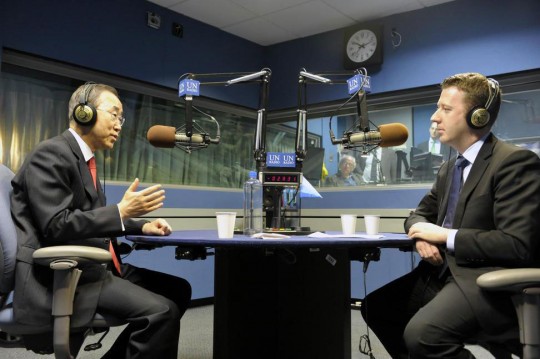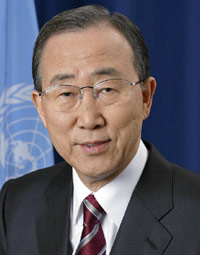Ban stresses ‘people power’ and partnerships at start of second term as UN chief
Ban stresses ‘people power’ and partnerships at start of second term as UN chief

Secretary-General Ban Ki-moon (left) sits for an interview with the UN News Centre and UN Radio
…
United Nations, New York, 3 January 2012 – Ban Ki-moon has begun his second term as Secretary-General of the United Nations by pledging to harness “the strong power of partnerships” to respond to the planet’s biggest challenges, such as tackling climate change, combating poverty and empowering women and girls.
In an interview today with the UN News Centre and UN Radio to mark the start of his second term, Mr. Ban, 67, stressed the need for unity, particularly among Member States and their citizens.
…
Ban Ki-moon has begun his second term as Secretary-General of the United Nations by pledging to harness “the strong power of partnerships” to respond to the planet’s biggest challenges, such as tackling climate change, combating poverty and empowering women and girls.
In an interview today with the UN News Centre and UN Radio to mark the start of his second term, Mr. Ban, 67, stressed the need for unity, particularly among Member States and their citizens.
“Together, nothing is impossible,” he said, adding that “if we strengthen these partnerships among governments, business communities, civil organizations and philanthropists, then I think all these powerful partnerships can bring us towards the right direction.”
We have to connect the dots among climate change, [the] food crisis, water scarcity, energy shortages and women’s empowerment and global health issues. These are all interconnected issues.
Mr. Ban reiterated his priorities for the second term, spelling out the five “generational opportunities” he sees for the UN: promoting sustainable development; preventing natural and man-made crises and disasters; making the world safer and more secure; helping countries and peoples in transition; and encouraging gender empowerment.
“We have to connect the dots among climate change, [the] food crisis, water scarcity, energy shortages and women’s empowerment and global health issues. These are all interconnected issues.”
Mr. Ban, whose second five-year term as Secretary-General began on Sunday, said “people power” and deepening globalization represented the biggest development since he first took office in 2007.
“We have seen so many people – marginalized people, oppressed people – who have been yearning for democracy, their dignity and human rights. We have [a] heavy responsibility to help them in [their] transition to democracy.
“With the deepening of globalization, we have seen so many things happening in the world. There are many good ideas and many people really wanted to be connected… We have to help this transition to materialize as soon as possible. Being united depends on us.”
The Secretary-General cited his meeting with a boy during a visit last year to the South Pacific island country of Kiribati – where the land is threatened by rising sea waters – as an example of the enormous faith and expectations which the peoples of the world invest in the UN.
“He appealed to me to ‘Please help us address this climate change. Our homes and our way of life may be swept away overnight’,” Mr. Ban recalled, saying it is one of the reasons why climate change must remain at the top of the global agenda.
The Secretary-General also emphasized the need to keep modernizing the UN in his second term to help the 193-member world body adapt to contemporary changes.
“Technology outpaces our current thinking, peoples’ ideas and our current way of working,” he noted. “We have to make our Organization more nimble, more efficient and effective, and transparent and accountable.”
###

Ban Ki-moon
Secretary-General of the United Nations.
Ban Ki-moon is the eighth Secretary-General of the United Nations. His priorities have been to mobilize world leaders around a set of new global challenges, from climate change and economic upheaval to pandemics and increasing pressures involving food, energy and water. He has sought to be a bridge-builder, to give voice to the world’s poorest and most vulnerable people, and to strengthen the Organization itself.“I grew up in war”, the Secretary-General has said, “and saw the United Nations help my country to recover and rebuild. That experience was a big part of what led me to pursue a career in public service. As Secretary-General, I am determined to see this Organization deliver tangible, meaningful results that advance peace, development and human rights.”Mr. Ban took office on 1 January 2007. Highlights of his tenure have included:
Promoting sustainable development
One of the Secretary-General’s first major initiatives was the 2007 Climate Change Summit, followed by extensive diplomatic efforts that have helped put the issue at the forefront of the global agenda. Subsequent efforts to focus on the world’s main anti-poverty targets, the Millennium Development Goals, have generated more than $60 billion in pledges, with a special emphasis on Africa and the new Global Strategy on Women’s and Children’s Health. At the height of the food, energy and economic crises in 2008, the Secretary-General successfully appealed to the G20 for a $1 trillion financing package for developing countries and took other steps to guide the international response and protect the vulnerable and poor.
Empowering women
The Secretary-General pressed successfully for the creation of UN Women, a major new agency that consolidates the UN’s work in this area. His advocacy for women’s rights and gender equality has also included the “Unite to End Violence against Women” campaign, the “Stop Rape Now” initiative, the creation of a “Network of Men Leaders” and the establishment of a new Special Representative on Sexual Violence in Conflict. Within the UN itself, the Secretary-General has increased the number of women in senior management positions by more than 40 per cent, reaching the highest level in the Organization’s history.
Supporting countries facing crisis or instability
The Secretary-General has sought to strengthen UN peace efforts, including through the New Horizons peacekeeping initiative, the Global Field Support Strategy and the Civilian Capacity Review, a package of steps to improve the impact of the 120,000 United Nations “blue helmets” operating in the world’s conflict zones. A mediation support unit, along with new capacity to carry out the Secretary-General’s good offices, have been set up to help prevent, manage and resolve tensions, conflicts and crises. Accountability for violations of human rights has received high-level attention through inquiries related to Gaza, Guinea, Pakistan and Sri Lanka, legal processes in Lebanon and Cambodia, and advocacy for the “responsibility to protect,” the new United Nations norm aimed at prevent and halt genocide and other grave crimes. He has also sought to strengthen humanitarian response in the aftermath of mega-disasters in Myanmar (2008), Haiti (2010) and Pakistan (2010), and mobilized UN support for the democratic transitions in North Africa and the Middle East.
Generating new momentum on disarmament, arms control and non-proliferation
The Secretary-General has sought to rejuvenate the disarmament agenda through a five-point plan, efforts to break the deadlock at the Conference on Disarmament and renewed attention to nuclear safety and security in the aftermath of the tragedy at the Fukushima Daiichi Nuclear Power Plant.
Strengthening the UN
The Secretary-Generalhas introduced new measures aimed at making the United Nations more transparent, effective and efficient. These include heightened financial disclosure requirements, compacts with senior managers, harmonization of business practices and conditions of service, the adoption of International Public Sector Accounting Standards, and continued investments in information technology and staff development.
Personal
The Secretary-General was born in the Republic of Korea on 13 June 1944. He received a bachelor’s degree in international relations from Seoul National University in 1970. In 1985, he earned a master’s degree in public administration from the Kennedy School of Government at Harvard University.At the time of his election as Secretary-General, Mr. Ban was his country’s Minister of Foreign Affairs and Trade. His 37 years of service with the Ministry included postings in New Delhi, Washington D.C. and Vienna, and responsibility for a variety of portfolios, including Foreign Policy Adviser to the President, Chief National Security Adviser to the President, Deputy Minister for Policy Planning and Director-General of American Affairs.Mr. Ban’s ties to the United Nations date back to 1975, when he worked for the Foreign Ministry’s United Nations Division. That work expanded over the years, with assignments that included service as Chairman of the Preparatory Commission for the Comprehensive Nuclear Test Ban Treaty Organization and Chef de Cabinet during the Republic of Korea’s 2001-2002 presidency of the UN General Assembly. Mr. Ban has also been actively involved in issues relating to inter-Korean relations.The Secretary-General speaks English, French and Korean. He and his wife, Madam Yoo (Ban) Soon-taek, whom he met in high school in 1962, have one son, two daughters and three grandchildren. Since 2007, Mrs. Ban has devoted her attention to women’s and children’s health, including autism, the elimination of violence against women, and the campaign to prevent mother-to-child transmission of HIV/AIDS.
###
> United Nations (UN).
 The United Nations was established on 24 October 1945 by 51 countries committed to preserving peace through international cooperation and collective security. Today, nearly every nation in the world belongs to the UN: membership totals 192 countries.
The United Nations was established on 24 October 1945 by 51 countries committed to preserving peace through international cooperation and collective security. Today, nearly every nation in the world belongs to the UN: membership totals 192 countries.
When States become Members of the United Nations, they agree to accept the obligations of the UN Charter, an international treaty that sets out basic principles of international relations. According to the Charter, the UN has four purposes:
- to maintain international peace and security;
- to develop friendly relations among nations;
- to cooperate in solving international problems and in promoting respect for human rights;
- and to be a centre for harmonizing the actions of nations.
###
* The above story is adapted from materials provided by United Nations (UN)
** More information at United Nations (UN)




















